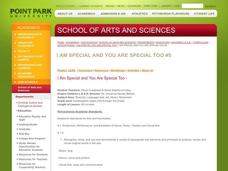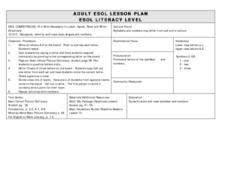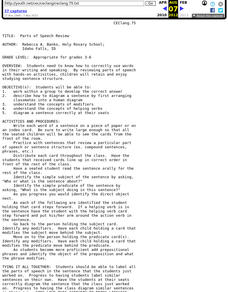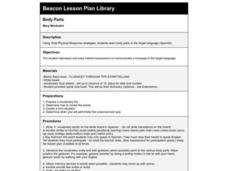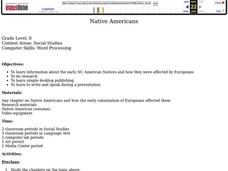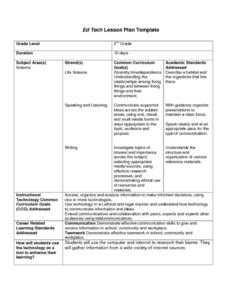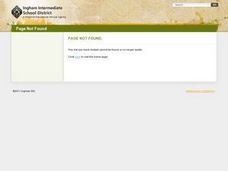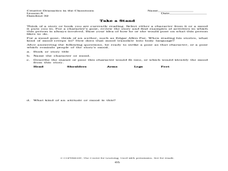Curated OER
ESOL Recognize Basic Questions
Students review information questions with who, what, when and where. They orally practice answering questions as a class then work in pairs to practice all questions and answers orally.
Curated OER
ESOL Shape identification
Students review vocabulary shape cards. They match oral words of shapes with flash cards then they make and label their own set of shape flash cards and then review with a classmate.
Curated OER
I Am Special and You Are Special Too
Students discover how everyone is special in his or her own way. In this character traits lesson, students demonstrate how they are special by drawing a picture or writing. Students listen orally to the book We Are All Alike...We Are All...
Curated OER
Critic's Choice
High schoolers read two opposing types literature. In groups, they role play the role of a critic to show they comprehend the material. They are introduced to new vocabulary and practice speaking the words in the foreign language.
Curated OER
Independent - To Be or Not Top Be: Say It Again, Uncle Sam
Fourth graders revise and edit an oral presentation on the American Revolution based on peer feedback. They refine their oral presentation style and pinpoint areas in need of improvement.
Curated OER
Research Project
Learners research a given topic and organize information in order to write a report or make an oral presentation. They design and create a visual aid (poster, model, PowerPoint, etc) to help clarify the concepts of their...
Curated OER
ESOL Basic numbers and SHapes
Students review then recognize the letters A-Z both uppercase and lowercase and the numbers 0-100. They practice letters orally then play a letter writing game and number game as a class.
Curated OER
Murals, Memories, and Making Art
Fourth graders examine the life and works of famous artists. Using the internet, they take notes and present their information to the class in an oral presentation. They create their own original artwork in the same style of their...
Curated OER
The "Big Four" of the Michigan Supreme Court
High schoolers identify the justices on the Michigan Supreme Court known as the "Big Four". They relate to them by researching their lives. They participate in an activity in which they practice their investigation and presentation skills.
Curated OER
Parts of Speech Review
Students need to know how to correctly use words in their writing and speaking. By reviewing parts of speech with hands-on activities, students retain and enjoy studying sentence structure.
Curated OER
Why Bother To Vote In Florida?
Fifth graders gain knowledge about the Florida 2000 Presidential Election, proposed changes in the process, and to practice communication skills, including listening and speaking. This lesson really gets at the heart of the changes made...
Curated OER
Lesson 2: Mapping With Words
Students demonstrate an understanding of the personal relationship that Wabanaki peoples had with the land by analyzing selected Wabanaki place names. They practice map-reading and map-making skills.
Curated OER
Native Americans
Eighth graders are assigned a group of Native Americans from the North Carolina area to study. They research and write a paper, including sections on family, government, food, clothing, shelter, European contact, artifacts and give an...
Curated OER
Historical Figures
Student research a "Historical Individual" using the Internet. They print a minimum of five articles and organize them. They create a visual biography of their historical figure.
Curated OER
Organisms and Habitats
Second graders investigate biomes and the plants and animals that are native to particular biomes. They participate in a class discussion, conduct Internet research on a selected biome, and create a shoebox biome using their Internet...
Curated OER
Pictorial Portfolio
Students develop a pictorial portfolio of important assignments, projects and activities through their high school years. They use a camera and decide what makes a good photograph. Students organize their photographs into a portfolio...
Curated OER
Same, But Different
Students compare and contrast specific characters in the book, "Old Henry." They discuss similarities and differences between people and define character traits. They assess one's own character traits and have a class discussion about...
Curated OER
Social Studies: What Is Folklife?
Young scholars read an essay about folklife and record their thoughts in journals. After discussing the terms associated with the topic, they complete worksheets on types of folklife, pop, elite, and folk cultures. Depending on the age...
Curated OER
Exploring the Personal Narrative
Young scholars define the characteristics of a personal narrative, explain the difference between a 'memoir' and an 'autobiography', and create a reading journal in which they will log their reading activities. In this personal narrative...
Curated OER
Mi Casa, Mi Pueblo y los Maya
High schoolers describe their own house and towns in Spanish and compare orally or in writing their own towns or cities with those of the Maya in English and Spanish establishing a common vocabulary.
Curated OER
Great Gullah Story Telling Packet
Sixth graders examine the Creole language known as Gullah which is a form of speech comprised of a number of unrelated languages. They determine how slaves used this to communicate so that slave masters would not be able to understand...
Curated OER
Social Studies: How Did Native Americans Live?
Fifth graders examine Edward Curtis' photographs and Robert Griffing's paintings to analyze Native American culture. They present research information on specific tribes, using the photos and paintings to uncover information about the...
Curated OER
Posture and Pantomime: Total Body Movement
Students analyze posture and pantomime in an analysis of total body movement. In this body movement lesson, students read a chart of movements and the mood or attitude they convey. Students complete several space and observation...




